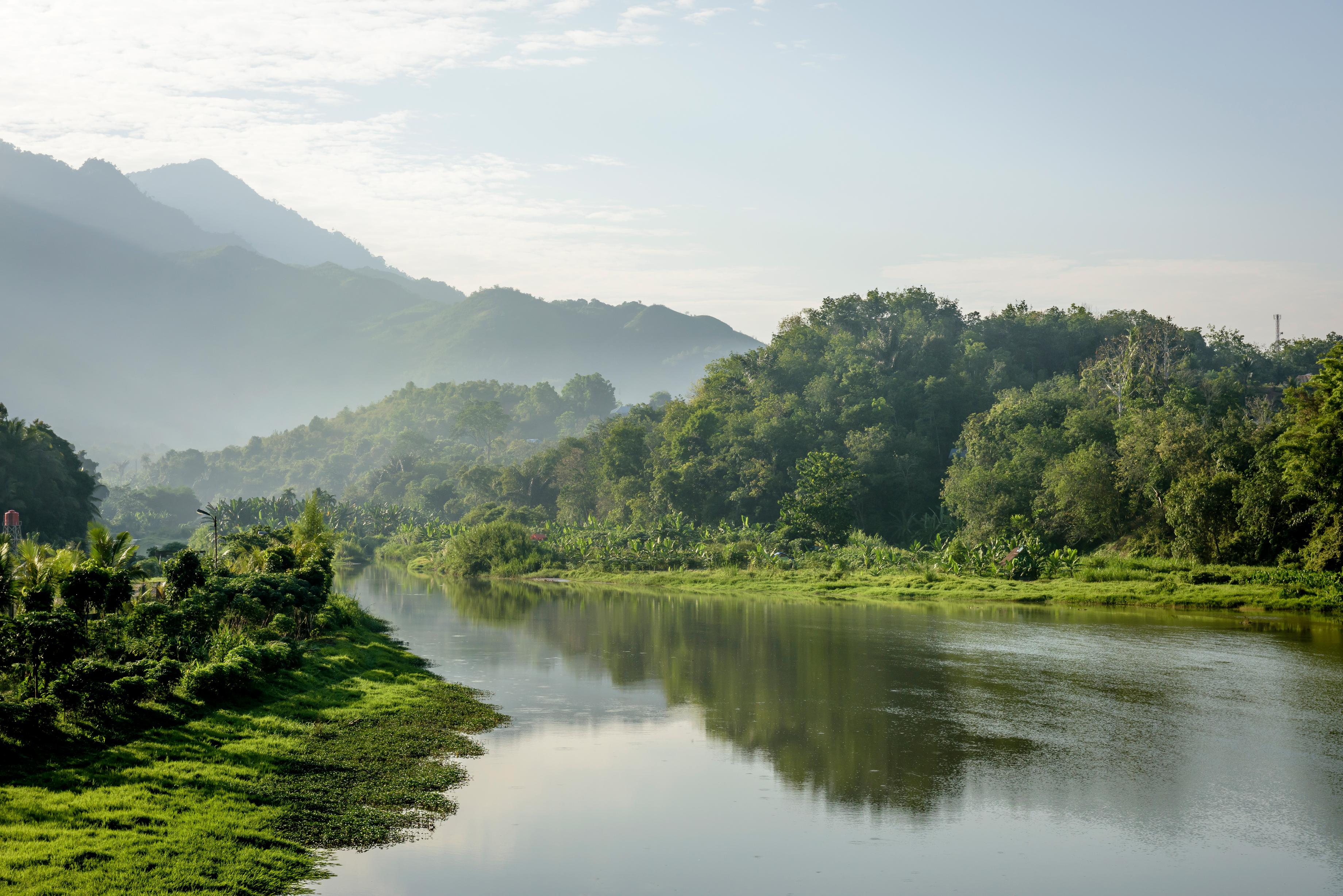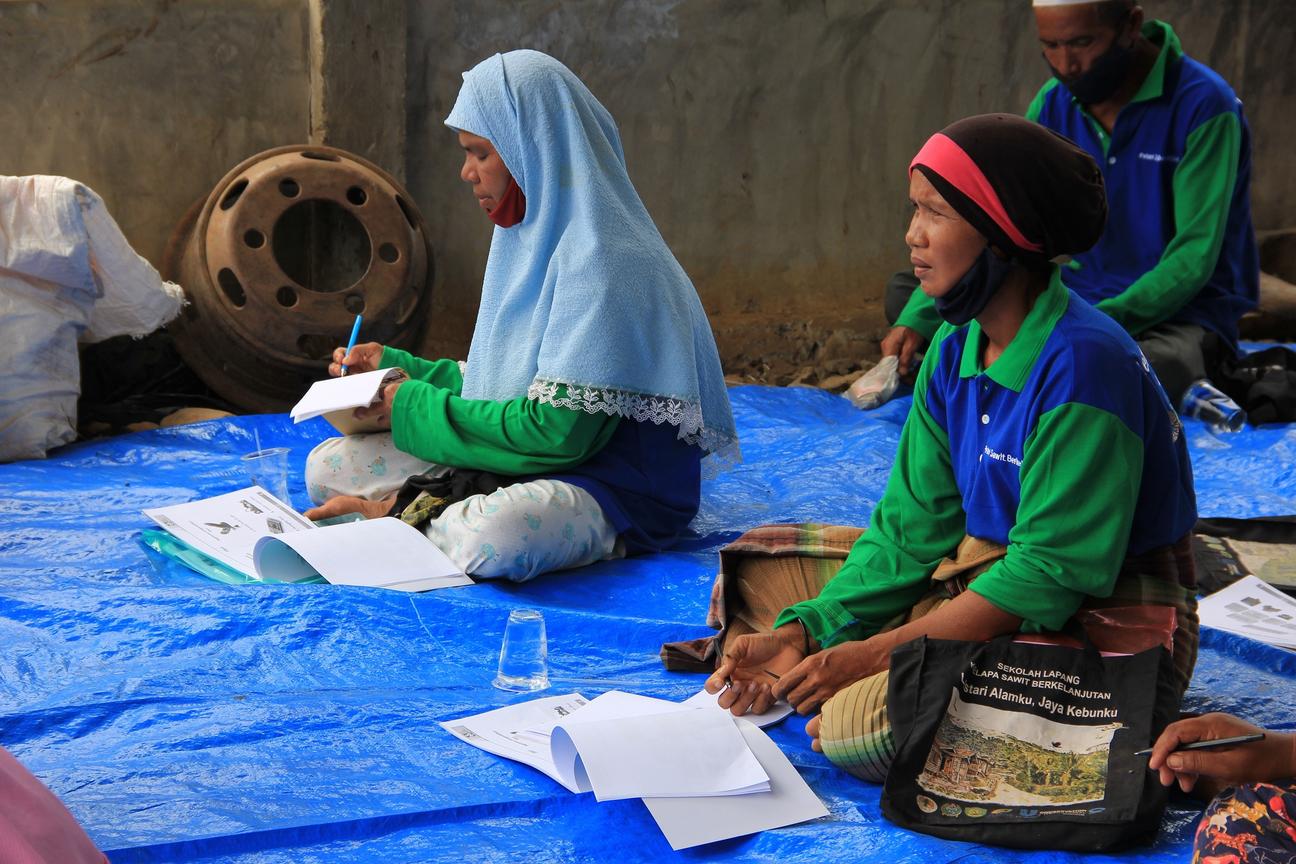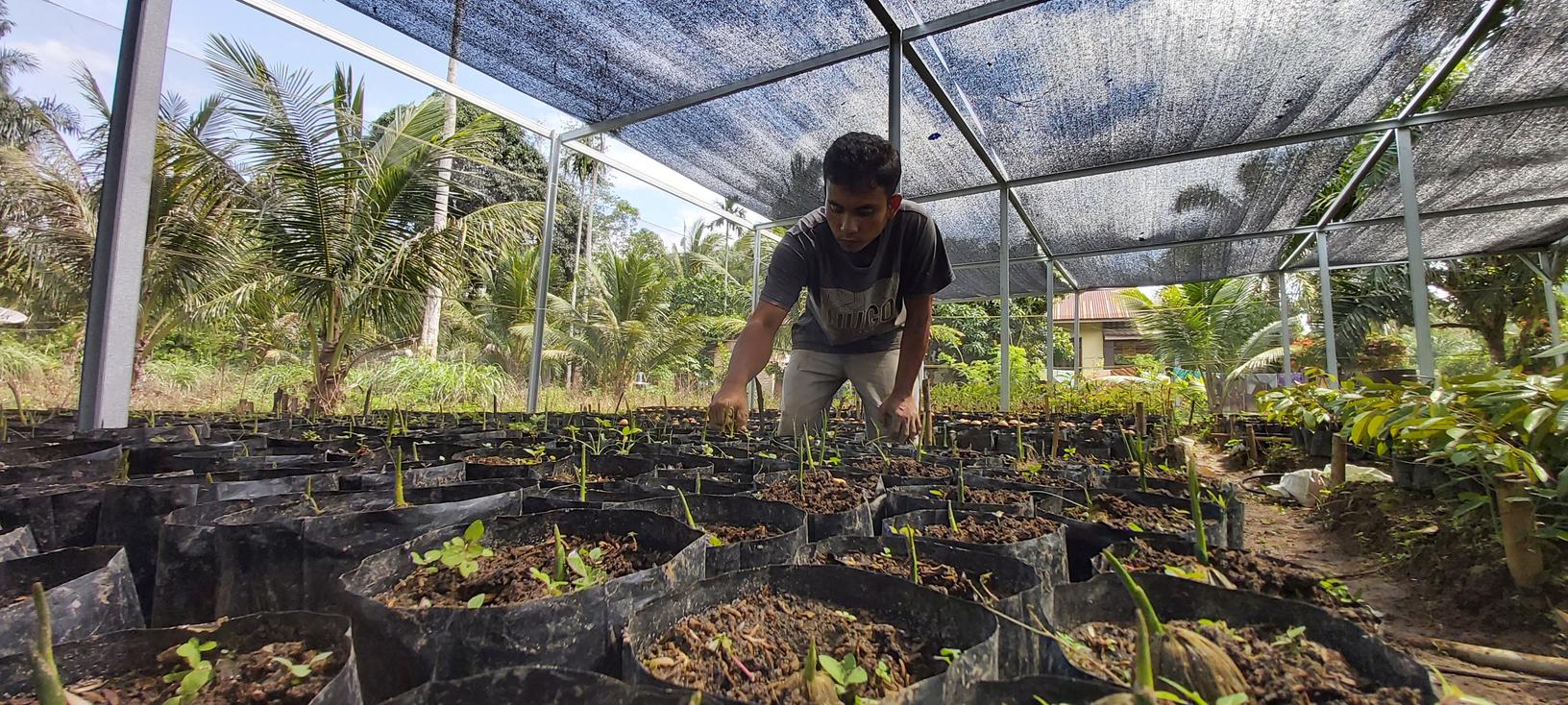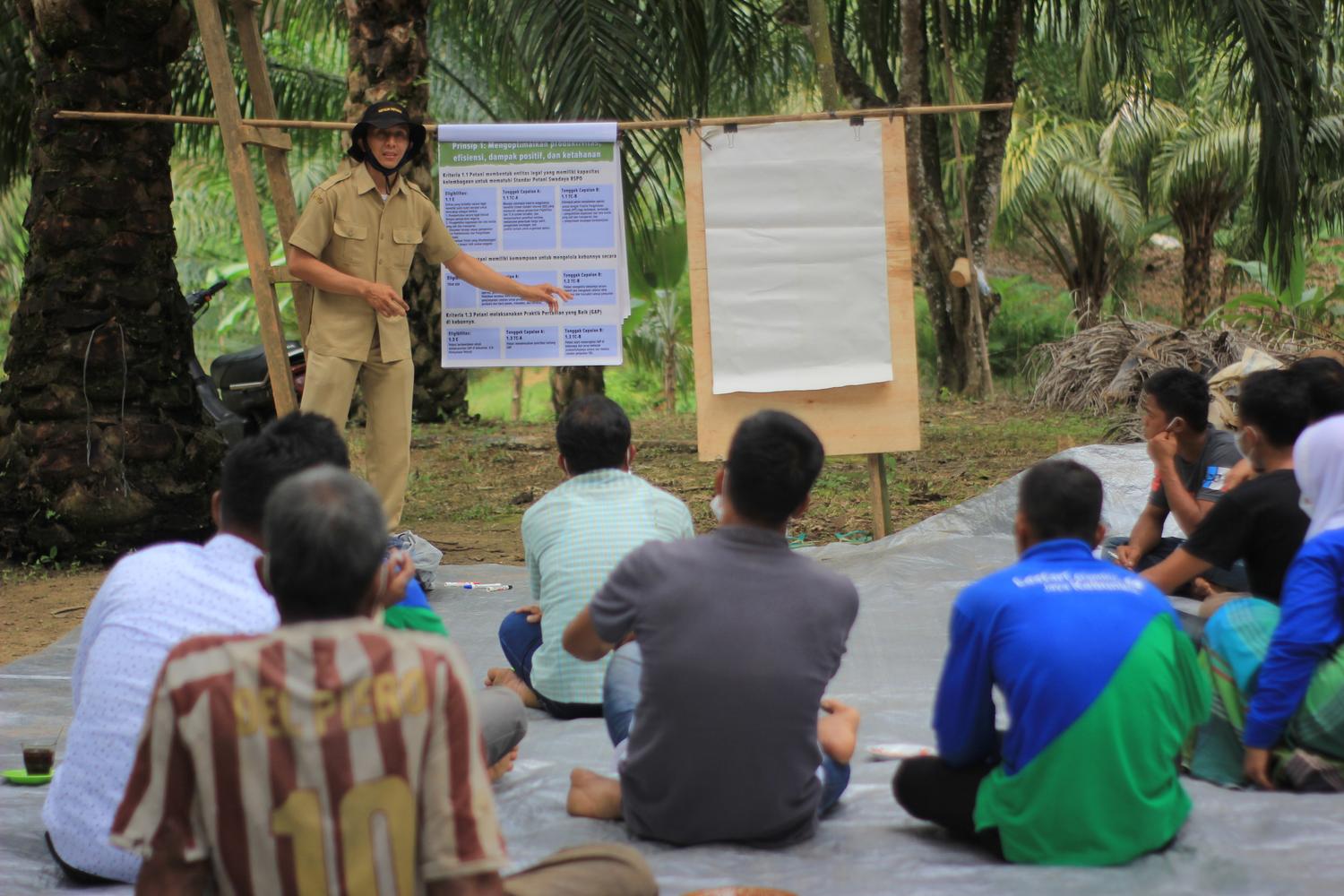
Palm oil is found in about 50 percent of the packaged products in supermarkets, from baked goods and snack foods to cosmetics and soaps. But the production of this remarkably versatile crop is also a major driver of deforestation.
Unilever, the parent company of over 400 brands around the world, has partnered with Conservation International and Konservasi Indonesia to transform the industry — building a sustainable and deforestation-free supply of palm oil that benefits both people and nature.
Our role
Conservation International, Konservasi Indonesia and Unilever are helping smallholder farmers in North Sumatra, Indonesia to produce sustainable palm oil in ways that maintain healthy forests. We are focused on the country’s Tapanuli Selatan district — a region where thousands of independent farmers grow oil palm and other crops. Here, we are working with partners to provide trainings on sustainable agriculture to help reduce the impact on forests while increasing productivity. We are also creating opportunities for local communities to engage in forest restoration and supporting government efforts to improve the management of protected forests.
Many stakeholders are working toward positive change in these regions – including government programs, private sector investments and civil society initiatives. Through the Coalition for Sustainable Livelihoods, we are helping to ensure these initiatives are coordinated, aligned and anchored in government support — achieving greater and longer lasting impacts for people and nature.
BY THE NUMBERS
By the end of 2023, Conservation International, Konservasi Indonesia and Unilever will work together to:
1000
smallholders
Train 1,000 independent oil palm smallholders and certify 800 of them
2
smallholder associations
Establish two smallholder associations to help oil palm smallholders increase yields and incomes
22000
trees
Plant 22,000 trees and restore 150 hectares (370 acres) of illegally planted oil palm to agroforestry and native species
127000
hectares
Support improved management of 127,000 hectares (313,824 acres) of forests under legal protection
The Impact

PRODUCE: Improving the livelihoods of smallholder farmers through sustainable palm oil
Unilever, Conservation International and Konservasi Indonesia are working with district government and two local smallholder associations to help 800 independent oil palm smallholders across four sub-districts in Tapanuli Selatan – Angkola Selatan, Angkola Sangkunur, Batang Toru and Muara Batang Toru – achieve certification through the Roundtable on Sustainable Palm Oil (RSPO). This certification process helps ensure oil palm is grown sustainably. In exchange, farmers receive benefits like additional income from the sale of certified sustainable palm oil.
Farmers involved in the training program have learned good practices for soil maintenance, harvesting techniques, organic composting and fertilizer application, as well as the importance of environmental management both on their farms and in the surrounding area. These farmers are already seeing benefits from the training program through increased yields, with some oil palm farmers reportedly doubling their production.
The project is on track to deliver RSPO certificates to 800 smallholders before December 2023. We hope its success will provide the foundation to scale sustainable production among other smallholders across the district.

RESTORE: Supporting community livelihoods and land tenure through restoration
We are providing alternative, sustainable livelihood opportunities to communities where oil palm has been planted illegally in protected forests. Konservasi Indonesia has worked with communities to convert these areas from illegal oil palm to other legal land-uses, including agroforestry.
In June 2022, the forest farmer group from Rianiate village, KTH Saroha, was awarded a social forestry permit by the Ministry of Environment and Forestry, which allows them legal access to manage and sustainably produce crops within protected forests. Since then, Konservasi Indonesia has provided farmers and community members with hands-on training on how to plant and maintain native species. A community nursery has also been established with seedlings for agroforestry crops. In total, more than 22,000 seedlings have been planted.
Communities are expected to benefit from improved land tenure as well as diversified agroforestry production systems, which help to develop new revenue streams and build resilience by reducing their reliance on a single crop.

PROTECT: Strengthening policy and management systems for forests and ecosystems
The Tapanuli Selatan region is home to important forest ecosystems that provide habitat for iconic species like the Tapanuli orangutan and the Sumatran tiger. Unilever, Conservation International and Konservasi Indonesia are working with local government to protect these critical areas through improved management and monitoring. We have deployed camera traps that have identified key habitats for wildlife, and we have assessed forests within the region that hold high amounts of climate-altering carbon. Our analysis found 176,502 hectares (436,146 acres) of high-value areas in lands zoned for production – an area larger than London. Based on these findings, Konservasi Indonesia has been working with the Tapanuli Selatan government to provide technical recommendations and support the design of district policies to formalize sustainable production and protection strategies.
With Unilever’s support, we also developed a “Multi-Use Forest Planning Toolkit,” that has helped government officials revise and strengthen their forest management plans — exploring new ways to balance protection and production across protected areas in Tapanuli Selatan and providing a resource for improved forest management across North Sumatra.
Our work with the local government, along with contributions from partners and stakeholders in the area, has helped reduce the deforestation rate by approximately 55 percent across 127,000 hectares (313,824 acres) of public lands since 2018.

COLLABORATE: Working together to align and scale efforts for sustainable production, conservation and restoration
Unilever and Conservation International have built collaboration as a key pillar of our partnership through the Coalition of Sustainable Livelihoods (CSL). CSL brings together a diverse set of stakeholders to align our priorities and to share lessons, successes and approaches from landscape initiatives like those in Tapanuli Selatan. By aligning public and private sector efforts, the CSL aims to help advance government programs and policies as well as contribute to supply chain sustainability for companies operating in and purchasing products from North Sumatra and Aceh.
Unilever has been an active member of CSL’s Interim Steering Group since 2019 and is providing core funding to support the CSL platform, including advancing CSL’s efforts around stakeholder engagement, facilitating alignment around common metrics and strengthening CSL’s governance and operational structures. Unilever is also providing support to CSL’s District Initiatives in Tapanuli Selatan and Aceh Tamiang, through their partnerships with Konservasi Indonesia and IDH.